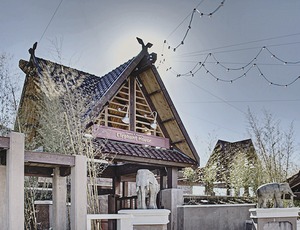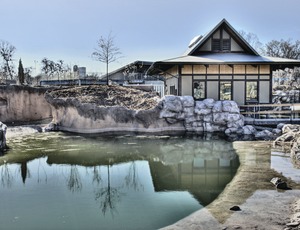

2012 Judges Special Recognition
2012 Best Project
Sports/Entertainment Category
Toyota Elephant Passage at Denver Zoo
Denver
The Toyota Elephant Passage Exhibit at the Denver Zoo is the first exhibit of its kind in the country, setting an example in sustainability for other zoos to follow. Many other zoos have LEED-certified buildings; however, the Toyota Elephant Passage (TEP) is the first LEED-Platinum-certified zoo exhibit in the U.S.
The zoo intends to turn more than 90% of the waste it produces into gases that can be harnessed for energy. The state-of-the-art TEP exhibit utilizes a first-of-its-kind gasification plant that is expected to supply more than 10% of the zoo's total power needs. The plant generates its power from animal waste and garbage collected at the zoo.
Kiewit provided preconstruction and construction services for the new exhibit. The project redeveloped approximately 10 acres of existing exhibits and service areas on the south side of the zoo campus. Kiewit's scope of work included the planning and construction of animal exhibits and their overnight quarters, support and ancillary facilities, and utility relocations and site improvements.
The existing site within the Denver campus was cleared, including demolition of approximately 17 existing structures. To minimize the environmental impact, 58 trees were protected during demolition and construction, and 30 trees were relocated within the project boundaries or elsewhere on the campus.
Communication and collaboration among all team members were critical at each step of the project. For instance, because elephants can sense water up to 5 ft underground, Kiewit had to bury the water lines below 5 ft to prevent them from being dug up. Several miles of underground piping were laid throughout the exhibit, and potential hazards at every linear foot had to be considered to ensure the lines couldn't be damaged.
The entire project team was extremely considerate of the animals. Everything from vehicle backup alarms to ordinary dust kicked up from construction operations was taken into account to ensure that animals were not disturbed or troubled in any way during construction.
Key Players
Owner: City and County of Denver, Denver Zoological Foundation, Denver
Architect: CLR Design Inc., Philadelphia
General Contractor: Kiewit Building Group Inc., Englewood, Colo.
Civil Engineer: SEH, Denver
Structural Engineer: Monroe & Newell, Denver
MEP: The RMH Group Inc., Lakewood, Colo.
Entry submitted by Kiewit Building Group Inc.

Post a comment to this article
Report Abusive Comment